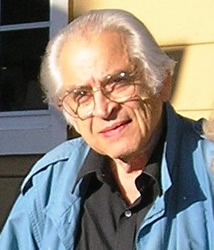

|

|
IN MEMORIAM
Raymond K. Kent
Professor of History, Emeritus
UC Berkeley
1929 – 2008
A distinguished member of the Department of History at the University of California, Berkeley, for more than 40 years, Professor Raymond K. Kent was born on June 14, 1929, in Belgrade as Radoje Knezevich, to a highly cultured family of Serbian diplomats. Educated in Trieste, his native Belgrade, and at the Polish Institute of General Studies in Beirut, he early became proficient in Italian, French, and Polish, as well as his native tongue. He came to the United States as a stateless person after serving in the British Royal Air Force and served in the U.S. Army from 1951 to 1953. Settling in New York, he took a B.S. and M.A. in government from Columbia University in 1958 and 1960, respectively, followed by a Ph.D. in 1967 from the University of Wisconsin, where he studied with the anthropologist and historian Professor Jan Vansina. During his stay in New York, he worked for MGM Metrotone News as a journalist and filmmaker, primarily dealing with Africa. In addition to his central interest in the European colonization of Africa, he learned Portuguese and developed an interest in Brazil.
Professor Kent joined the Berkeley faculty in 1966 and retired in 1991, after heading the departmental section of African history. His continuous research interests centered on the island of Madagascar, its indigenous population, colonization by the French, and ultimate independence in 1960. The three major books Kent wrote cover the whole history of the island: From Madagascar to the Malagasy Republic (1962); Early Kingdoms in Madagascar, 1500-1700 (1970); and The Many Faces of an Anti-Colonial Revolt: Madagascar’s Long Journey into 1947 (2007). He also edited essays about the island under the title of Madagascar in History (1979). Kent developed a side interest in black Africans in Brazil, and taught a variety of courses on Latin America before the department hired a specialist in this field. Students and colleagues were dazzled by his encyclopedic knowledge of Africa and Latin America, their languages, and cultural customs.
Disagreeing strongly with earlier scholars, Kent tried to disaggregate the notion created by the Malagache themselves that their history belonged to a single ethnic group. He showed that the island was probably first populated by Indonesian settlers, followed by South African migrations that led to the establishment of three tribal regions before French colonization. The evidence he adduced for this complex hypothesis came from linguistic, material, and commercial data, as well as oral traditions, debunking earlier suggestions of a primarily Muslim immigration.
Kent examined in detail the colonization of Madagascar by the French, which they depicted as “pacification” but which amounted to cruel repression of natives by colonists. A major part of his argument concerning the 1947 revolt and repression signaled the long-standing set of grievances about the treatment of natives as second-class citizens. Class conflicts merged with economic forces that were exacerbated by new impositions placed on the native population to support the conflict of World War II. Following a brief period of British rule, when food shortages added to the anger of the indigenous population, a violent civil war ensued. Kent’s deft treatment of all these issues provided a perspective on decolonization different from standard explanations for mainland Africa. Madagascar attained its independence only in 1960.
As an active and strong voice in local affairs, Professor Kent was a champion for African studies, both in the department and the Institute of International Studies. He was known as a demanding teacher who prepared carefully organized lectures backed by an enormous volume of concrete evidence. As an independent thinker, he was never afraid to take a stand that ran counter to student prejudices.
The same attitude prevailed in his views on contemporary issues, particularly those involving his native Serbian countrymen. Until the end, Professor Kent remained loyal to his personal roots. He died on August 13, 2008, and is survived by his loving wife Estelle Kent.
Roger Hahn 2009
Mary Elizabeth Berry
Tabitha Kanogo